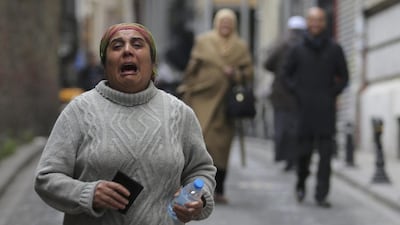The horrific suicide bombing in the heart of Istanbul’s tourist district on Saturday is a stark reminder of the challenges facing Turkey. A suicide bomber detonated himself on Istiklal Avenue, a meandering pedestrian-only street connecting Taksim Square and the iconic Galata Tower. According to initial reports, the bomber failed to reach his primary target and instead targeted a group of foreigners.
For several months, Turkey has been consumed by terrorist attacks. ISIL carried out a suicide bombing in Istanbul targeting German tourists and offshoots of the outlawed Kurdistan Workers’ Party (PKK) targeted the Turkish capital with suicide bombers. Hundreds of people have been killed, and yet there hasn’t been a single high-profile resignation in the Turkish government or security establishment.
Since the peace process between the PKK and the Turkish government fell apart last June, Ankara has been fighting an increasingly bloody war in the country’s Kurdish-dominated south-east.
In cities such as Diyarbakir – one of the largest cities in southeastern Turkey and home to tens of thousands of Kurds – security forces have launched a counterinsurgency campaign against the PKK, which is designated as a terrorist organisation by the European Union and the United States. Entire towns and civilian populations have been placed under military curfew, while hundreds of civilians have been killed in the fighting.
The PKK and its alleged offshoots have responded with attacks in major Turkish cities against government buildings and military installations that conjure images of the early days of the PKK’s paramilitary activity in the 1980s.
Recent attacks have also killed scores of civilians and bystanders. Earlier this month, Seher Cagla Demir, a 24-year-old student from eastern Turkey, detonated herself close to the prime minister’s office in central Ankara at rush hour. Thirty-seven people were killed.
The Turkish government rushed to place the blame on the PKK, but it was a little-known splinter group called the Kurdistan Freedom Falcons (TAK) that claimed responsibility for that attack. Founded in 2004, TAK is a Kurdish nationalist group that aims to create an independent state in eastern Turkey.
TAK was reportedly founded by former members of the PKK who were angered by the prospect of a peace process between the Kurds and the Turkish government. From this context, TAK operates in a similar way to splinter groups in the Northern Ireland conflict that carried out unapproved attacks to destabilise the peace process.
With a full-blown counterinsurgency campaign against the PKK, Turkey has deliberately blurred the lines between TAK and the PKK. Ankara claims the PKK covers up its attacks through a vast infrastructure of armed wings that includes TAK.
In turn, the PKK is able to earn international sympathy by washing itself of direct responsibility of attacks on Turkish civilian targets, such as the February 26 bombing in Ankara, which killed 28 people and was claimed by TAK.
Since the last Ankara bombing, the Turkish air force has pounded PKK targets throughout the region. In Syria, the military has gone after the YPG, a group that receives US air support in its fight against ISIL.
Members of the ruling Justice and Development party have also threatened the pro-Kurdish People’s Democratic Party with the possibility of prosecution for assisting terror groups.
While the PKK threat is all too real, Turkey’s leadership has regularly made lightly substantiated claims about the reach of the Kurds while ignoring the menacing threat that ISIL poses just across the border in Syria.
A popular talking point is the connection between the PKK’s offshoots and the YPG in Syria, which receives US air support in its fight against ISIL. Instead of supporting its claims with concrete evidence, Turkey falls back on what it claims is the source of all of its problems: the PKK.
Indeed, if you were to rely solely on the Turkish leadership, you might think that the PKK was the only threat facing Turkey.
But the attack in Istanbul is an unavoidable reminder of the gravity of Turkey’s problems. It was an attack on the Turkish economy and tourism sector.
While the PKK and its offshoots have said that no target is off limits, they have generally preferred to attack symbols of state power rather than foreign tourists. ISIL, on the other hand, has targeted Western tourists and warned that it will go after secular institutions in Turkey, like Istiklal Avenue and its surrounding bar-filled streets.
This attack demonstrates that Turkey must crackdown on ISIL’s network inside the country. Yet, there is no evidence that authorities are carrying out raids on ISIL at the moment.
But other countries are working on the threat and how to contain it. In the days before the Istanbul bombing, Germany and the United States both warned their citizens of a possible attack.
Germany took the unprecedented step of closing its two main diplomatic buildings last week. Istanbul’s governor, however, dismissed German concerns and implied that some foreign countries were getting excited over “unconfirmed information”.
This episode contains an important lesson. The fallout of the Syrian civil war and the rise of ISIL shouldn’t be downplayed because of the PKK threat.
While the current leadership believes that the solution to terror is a military one against the PKK and its offshoots, the country is not operating in a vacuum and cannot rely on itself alone in this battle.
In the aftermath of Saturday’s attack, many Turks took to social media before the government restricted access to thank Germany for the warnings that Ankara seemingly ignored. Whether the leadership likes it or not, Turkey is in the middle of a global crisis and can’t protect itself all by itself.
jdana@thenational.ae
On Twitter: @ibnezra

